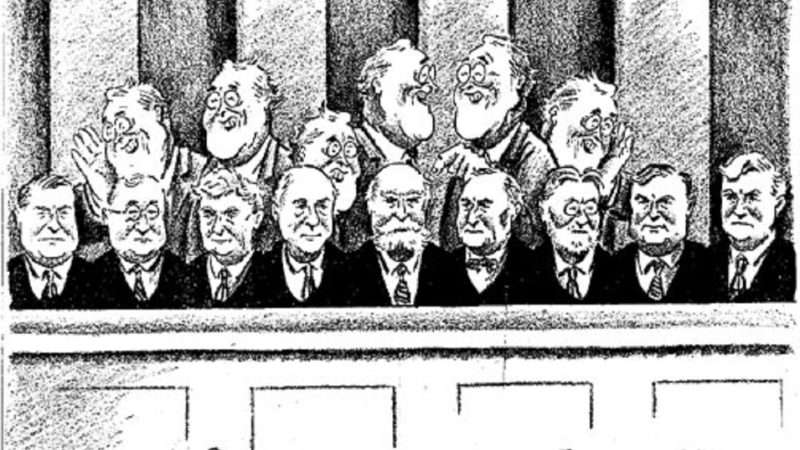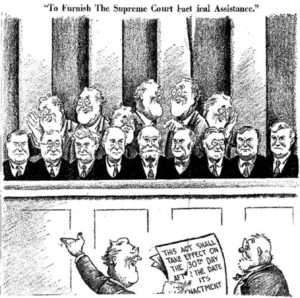

Duke Law School Prof. Neil Siegel, a prominent liberal constitutional law scholar has posted "The Trouble With Court-Packing," a new article that is probably the most thorough and comprehensive critique of recent calls for court-packing, so far. It's also notable for coming from someone who is no fan of either the present conservative majority on the Court or the procedural shenanigans that the GOP used to help achieve it. Here's the abstract:
Fundamental questions of constitutional policy, norms, and law are implicated by the wide-ranging public discussion of U.S. Supreme Court reform. This Article focuses on the reform proposal that poses the greatest threat to judicial legitimacy and independence: Court-packing. The Article contends that there has likely been a constitutional convention against Court-packing for a long time now, although it is uncertain whether the convention continues to exist given Senate conduct since 2016. The Article also maintains that Court-packing is not as free from constitutional difficulty as the conventional wisdom holds, even if the arguments for its constitutionality are stronger on balance. Most importantly, the Article offers an analytical framework for thinking about Court-packing that rests upon a common ground foundation: the Court performs critical functions that most Americans want it to perform; most of the time, it performs most of these functions better than the available governmental alternatives; and Court-packing would almost certainly damage, if not destroy, its ability to continue performing these functions by impairing its legitimacy and independence. Court-packing should therefore be reserved for extreme situations, in which adding seats would: (1) respond proportionally to a previous instance of Court-packing; (2) restore the Court's legitimacy in the eyes of a large majority of Americans; or (3) meet a national crisis to which the Court was contributing. Moreover, even when an extreme situation exists, Congress should ask itself whether it can legislate in other ways to address pressing problems before packing the Court. Applying this framework, the Article cuts against the ideological grain of current debates. As many progressives advocate Court-packing and many conservatives oppose it, the Article shows that there are principled reasons to oppose Court-packing at this time even if one believes that Senate Republicans violated an important convention requiring good-faith consideration of Supreme Court nominees, and even if one is deeply concerned about the ideological orientation and methodological assertiveness of the current Court.
Some of the points in the article recapitulate and build on previous criticisms of court-packing, including those included in the recent report of President Biden's Supreme Court Commission. I have advanced a variety of related critiques myself (e.g. here). But Siegel makes some important new points, including this one, summarized in his recent post at the Balkinization blog:
One prominent argument in favor of Court-packing now is that the Republican Party, under the leadership of Donald Trump, is threatening to end American democracy. If this happens, the Democrats will not be able to change the Court's composition over time through winning elections and controlling the judicial appointments process.
The greatest risk to American democracy in current times is indeed that lies about voter fraud or other asserted "legal irregularities" will enable the Republican presidential candidate in 2024—whether Trump or someone similarly anti-democratic—to steal the election through politicized state election officials who manipulate vote counting, or through Republican-led state legislatures that reject the popular vote in their states and submit alternative slates of presidential electors to the Electoral College…..
Professor Richard Hasen has recently identified what seems most likely to prevent such attacks on American democracy from succeeding. It a broad-based coalition—including progressives, moderate liberals, independents, and democracy-defending Republicans—who are all prepared to put profound policy differences aside for the time being to protect American democracy by voting for, and otherwise supporting, the Democratic presidential candidate should the alternative be Trump or another candidate who is anti-democratic. Political scientist Daniel Ziblatt likewise has observed that this approach worked in the past in some European democracies….
With respect to Court-packing, a key question worth asking is whether a move by Democrats to add four seats to the Court would make it more or less likely for such a coalition to form. One cannot know the answer with certainty, but it would likely turn primarily on the reactions of democracy-defending Republicans to Court-packing, because they are the ones most likely to be alienated by it. There is a real risk that they would regard Court-packing as so incendiary that it would render such a coalition impossible to form.
I share both Siegel's concerns about the Trumpist/GOP threat to democratic transfers of power, and the potential for court-packing to undermine the coalition needed to contain it. Court-packing is almost universally opposed by conservative, libertarian, and centrist opponents of Trumpism. Moreover, many of them (rightly, in my view) see it as not just another policy issue but as a serious assault on a vital liberal democratic institution, in its own right. Thus, it could easily turn out be a deal-breaker for any broad anti-Trumpist coalition.
I would add two points to Siegel's analysis of this issue in the post. First, even if Democratic court-packing helps stave off the next 2020-like attempt at a Trumpist coup (say, in 2024), it is unlikely to keep illiberal politicians permanently out of power. The next Trump-like president could (if his party also controls both houses of Congress) respond to the Democratic court-packing effort with one of his own, thereby ensuring a Supreme Court that cooperates with his efforts to stay in power, even if after losing an election. Once one side packs the court, it becomes easy for the other to respond in kind, whenever they get the chance. More generally, liberal democracy benefits from having an independent judiciary, which court-packing is likely to undermine. That is why, as Siegel, notes in the article, court-packing has been a standard tactic of incipient authoritarians around the world.
Second, it is worth noting that the current Supreme Court majority did in fact help curb Trumpist efforts to steal the 2020 election, as also did numerous conservative lower-court judges. A judicial branch weakened by court-packing might well be unable to do that in the future. As Neil says in the article, a packed court "might well have accepted Trump's arguments."
I don't agree with every single point in the article. For example, I am more sympathetic than Siegel is to the idea of permanently banning court-packing by constitutional amendment. But I also recognize such an amendment is highly unlikely to be enacted anytime soon, if ever.
Be that as it may, this is the most compelling critique of court-packing to date. A must-read for anyone interested in the issue.
The post Neil Siegel on "The Trouble With Court-Packing" appeared first on Reason.com.







